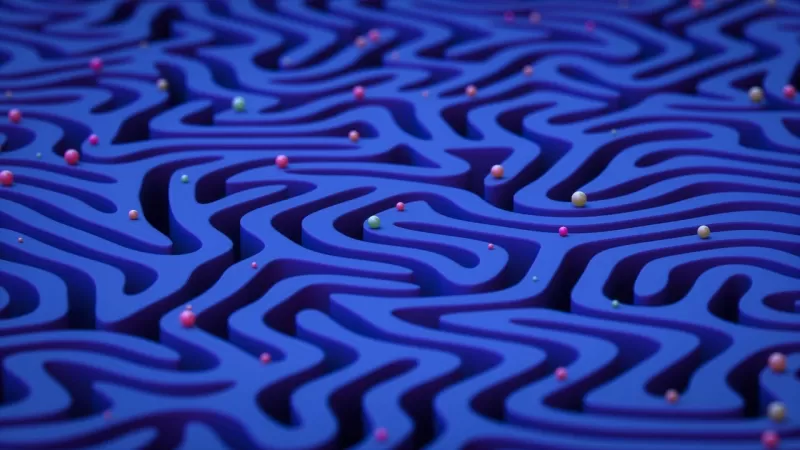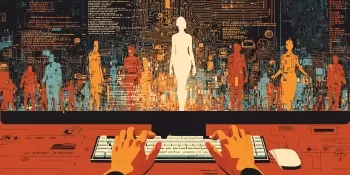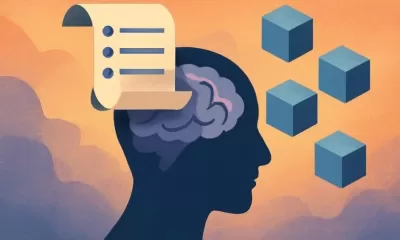AI Scholars Awarded Turing Prize for Technique Behind AlphaGo's Chess Victory

In the past decade, artificial intelligence has dazzled us with its advancements, particularly through a technique where computers make random choices and learn from the outcomes. This method, known as reinforcement learning, has been pivotal in achieving remarkable feats in AI.
Take Google DeepMind's AlphaZero program from 2016, which by 2018 had mastered the complex games of chess, shogi, and Go. Similarly, AlphaStar used this approach to reach "grandmaster" level in the video game *Starcraft II*. These achievements highlight the power of reinforcement learning.
On Wednesday, the field celebrated a significant milestone as two AI scholars were honored for their groundbreaking work in advancing reinforcement learning. Andrew G. Barto, a professor emeritus at the University of Massachusetts, Amherst, and Richard S. Sutton, a professor at the University of Alberta, Canada, received the prestigious 2025 Turing Award from the Association for Computing Machinery (ACM).
Recognition of Pioneers in Reinforcement Learning
The ACM praised Barto and Sutton for laying the groundwork for reinforcement learning, stating that they "introduced the main ideas, constructed the mathematical foundations, and developed important algorithms." This accolade, which comes with a $1 million prize, is often seen as the computer industry's equivalent of a Nobel Prize.
Reinforcement learning can be likened to a mouse navigating a maze to find cheese. The mouse learns which paths lead to progress and which to dead ends. Similarly, neuroscientists believe intelligent beings, like mice, develop an "internal model of the world" to guide their actions.
Sutton and Barto proposed that computers could also develop such internal models. In reinforcement learning, the computer gathers data about its environment—be it a maze or a chessboard—and initially acts randomly. It receives feedback in the form of rewards or penalties, which helps it estimate the outcomes of different actions. Based on these estimates, the program develops a "policy" to guide future decisions, balancing the exploration of new actions with the exploitation of known successful ones.
The Role of Exploration and Exploitation
At its core, reinforcement learning requires a delicate balance between exploring new possibilities and exploiting known strategies. Neither approach alone is sufficient for success.
For those interested in diving deeper, Sutton and Barto's 2018 textbook on the subject is a valuable resource.
It's worth noting that the term "reinforcement learning" is sometimes used differently by companies like OpenAI, which employ "reinforcement learning from human feedback" (RLHF) to refine the outputs of large language models like GPT. However, this is distinct from the method developed by Sutton and Barto.
Reinforcement Learning as a Theory of Thought
Sutton, who was a Distinguished Research Scientist at DeepMind from 2017 to 2023, has argued that reinforcement learning is not just a technique but a "theory of thought." He has expressed concern about the lack of a computational theory in AI, asserting that "reinforcement learning is the first computational theory of intelligence."
Beyond its technical applications, reinforcement learning may also shed light on creativity and free play as expressions of intelligence. Sutton and Barto have highlighted the role of play in learning, suggesting that curiosity drives exploration. Sutton has emphasized that play can involve setting goals that may not be immediately useful but could prove beneficial later.
"Play is a big thing," Sutton remarked, indicating its significant role in the broader context of learning and intelligence.
The journey of reinforcement learning, from its foundational work by Barto and Sutton to its application in games and beyond, continues to push the boundaries of what AI can achieve.
Related article
 Manus Debuts 'Wide Research' AI Tool with 100+ Agents for Web Scraping
Chinese AI innovator Manus, which previously gained attention for its pioneering multi-agent orchestration platform catering to both consumers and professional users, has unveiled a groundbreaking application of its technology that challenges convent
Manus Debuts 'Wide Research' AI Tool with 100+ Agents for Web Scraping
Chinese AI innovator Manus, which previously gained attention for its pioneering multi-agent orchestration platform catering to both consumers and professional users, has unveiled a groundbreaking application of its technology that challenges convent
 Why LLMs Ignore Instructions & How to Fix It Effectively
Understanding Why Large Language Models Skip Instructions
Large Language Models (LLMs) have transformed how we interact with AI, enabling advanced applications ranging from conversational interfaces to automated content generation and programming ass
Why LLMs Ignore Instructions & How to Fix It Effectively
Understanding Why Large Language Models Skip Instructions
Large Language Models (LLMs) have transformed how we interact with AI, enabling advanced applications ranging from conversational interfaces to automated content generation and programming ass
 Pebble Reclaims Its Original Brand Name After Legal Battle
The Return of Pebble: Name and AllPebble enthusiasts can rejoice - the beloved smartwatch brand isn't just making a comeback, it's reclaiming its iconic name. "We've successfully regained the Pebble trademark, which honestly surprised me with how smo
Comments (12)
0/200
Pebble Reclaims Its Original Brand Name After Legal Battle
The Return of Pebble: Name and AllPebble enthusiasts can rejoice - the beloved smartwatch brand isn't just making a comeback, it's reclaiming its iconic name. "We've successfully regained the Pebble trademark, which honestly surprised me with how smo
Comments (12)
0/200
![NicholasAdams]() NicholasAdams
NicholasAdams
 August 16, 2025 at 7:00:59 AM EDT
August 16, 2025 at 7:00:59 AM EDT
This reinforcement learning stuff is wild! AlphaGo beating chess champs? Mind blown 🤯. Makes me wonder how far AI can push human limits—scary but exciting!


 0
0
![GeorgeTaylor]() GeorgeTaylor
GeorgeTaylor
 August 10, 2025 at 3:00:59 PM EDT
August 10, 2025 at 3:00:59 PM EDT
Mind-blowing how reinforcement learning led to AlphaGo's chess win! 🤯 Makes me wonder what other games AI will conquer next.


 0
0
![ArthurBrown]() ArthurBrown
ArthurBrown
 April 21, 2025 at 6:39:03 PM EDT
April 21, 2025 at 6:39:03 PM EDT
The AI Scholars Awarded Turing Prize really blew my mind! The way they used reinforcement learning to make AlphaGo win at chess is just genius. It's like watching a sci-fi movie come to life. I wish I understood the tech better, but it's still super cool! 🤓


 0
0
![EdwardTaylor]() EdwardTaylor
EdwardTaylor
 April 21, 2025 at 12:00:52 AM EDT
April 21, 2025 at 12:00:52 AM EDT
AlphaGoのチェス勝利の背後にある技術でAI Scholarsがチューリング賞を受賞したのは驚きです!強化学習がAIをこれほどの高みに押し上げたのを見るのは魅力的です。ただ、時々技術的な内容が難しすぎることがありますが、それでも人間の創意工夫の証です。境界を押し広げ続けてください!🧠


 0
0
![WalterSanchez]() WalterSanchez
WalterSanchez
 April 20, 2025 at 9:09:05 PM EDT
April 20, 2025 at 9:09:05 PM EDT
The AI Scholars winning the Turing Prize for the technique behind AlphaGo's chess victory is mind-blowing! It's fascinating to see how reinforcement learning has propelled AI to such heights. The only thing is, it's a bit too technical for me at times, but still, it's a testament to human ingenuity. Keep pushing the boundaries! 🧠


 0
0
![WillieJackson]() WillieJackson
WillieJackson
 April 20, 2025 at 5:42:21 AM EDT
April 20, 2025 at 5:42:21 AM EDT
¡Los académicos de IA que recibieron el Premio Turing por la técnica detrás de la victoria de AlphaGo en el ajedrez me dejaron asombrado! Usar el aprendizaje por refuerzo para ganar es genial. Me gustaría entender mejor la tecnología, pero aún así es muy cool! 🤓


 0
0

In the past decade, artificial intelligence has dazzled us with its advancements, particularly through a technique where computers make random choices and learn from the outcomes. This method, known as reinforcement learning, has been pivotal in achieving remarkable feats in AI.
Take Google DeepMind's AlphaZero program from 2016, which by 2018 had mastered the complex games of chess, shogi, and Go. Similarly, AlphaStar used this approach to reach "grandmaster" level in the video game *Starcraft II*. These achievements highlight the power of reinforcement learning.
On Wednesday, the field celebrated a significant milestone as two AI scholars were honored for their groundbreaking work in advancing reinforcement learning. Andrew G. Barto, a professor emeritus at the University of Massachusetts, Amherst, and Richard S. Sutton, a professor at the University of Alberta, Canada, received the prestigious 2025 Turing Award from the Association for Computing Machinery (ACM).
Recognition of Pioneers in Reinforcement Learning
The ACM praised Barto and Sutton for laying the groundwork for reinforcement learning, stating that they "introduced the main ideas, constructed the mathematical foundations, and developed important algorithms." This accolade, which comes with a $1 million prize, is often seen as the computer industry's equivalent of a Nobel Prize.
Reinforcement learning can be likened to a mouse navigating a maze to find cheese. The mouse learns which paths lead to progress and which to dead ends. Similarly, neuroscientists believe intelligent beings, like mice, develop an "internal model of the world" to guide their actions.
Sutton and Barto proposed that computers could also develop such internal models. In reinforcement learning, the computer gathers data about its environment—be it a maze or a chessboard—and initially acts randomly. It receives feedback in the form of rewards or penalties, which helps it estimate the outcomes of different actions. Based on these estimates, the program develops a "policy" to guide future decisions, balancing the exploration of new actions with the exploitation of known successful ones.
The Role of Exploration and Exploitation
At its core, reinforcement learning requires a delicate balance between exploring new possibilities and exploiting known strategies. Neither approach alone is sufficient for success.
For those interested in diving deeper, Sutton and Barto's 2018 textbook on the subject is a valuable resource.
It's worth noting that the term "reinforcement learning" is sometimes used differently by companies like OpenAI, which employ "reinforcement learning from human feedback" (RLHF) to refine the outputs of large language models like GPT. However, this is distinct from the method developed by Sutton and Barto.
Reinforcement Learning as a Theory of Thought
Sutton, who was a Distinguished Research Scientist at DeepMind from 2017 to 2023, has argued that reinforcement learning is not just a technique but a "theory of thought." He has expressed concern about the lack of a computational theory in AI, asserting that "reinforcement learning is the first computational theory of intelligence."
Beyond its technical applications, reinforcement learning may also shed light on creativity and free play as expressions of intelligence. Sutton and Barto have highlighted the role of play in learning, suggesting that curiosity drives exploration. Sutton has emphasized that play can involve setting goals that may not be immediately useful but could prove beneficial later.
"Play is a big thing," Sutton remarked, indicating its significant role in the broader context of learning and intelligence.
The journey of reinforcement learning, from its foundational work by Barto and Sutton to its application in games and beyond, continues to push the boundaries of what AI can achieve.
 Manus Debuts 'Wide Research' AI Tool with 100+ Agents for Web Scraping
Chinese AI innovator Manus, which previously gained attention for its pioneering multi-agent orchestration platform catering to both consumers and professional users, has unveiled a groundbreaking application of its technology that challenges convent
Manus Debuts 'Wide Research' AI Tool with 100+ Agents for Web Scraping
Chinese AI innovator Manus, which previously gained attention for its pioneering multi-agent orchestration platform catering to both consumers and professional users, has unveiled a groundbreaking application of its technology that challenges convent
 Why LLMs Ignore Instructions & How to Fix It Effectively
Understanding Why Large Language Models Skip Instructions
Large Language Models (LLMs) have transformed how we interact with AI, enabling advanced applications ranging from conversational interfaces to automated content generation and programming ass
Why LLMs Ignore Instructions & How to Fix It Effectively
Understanding Why Large Language Models Skip Instructions
Large Language Models (LLMs) have transformed how we interact with AI, enabling advanced applications ranging from conversational interfaces to automated content generation and programming ass
 Pebble Reclaims Its Original Brand Name After Legal Battle
The Return of Pebble: Name and AllPebble enthusiasts can rejoice - the beloved smartwatch brand isn't just making a comeback, it's reclaiming its iconic name. "We've successfully regained the Pebble trademark, which honestly surprised me with how smo
Pebble Reclaims Its Original Brand Name After Legal Battle
The Return of Pebble: Name and AllPebble enthusiasts can rejoice - the beloved smartwatch brand isn't just making a comeback, it's reclaiming its iconic name. "We've successfully regained the Pebble trademark, which honestly surprised me with how smo
 August 16, 2025 at 7:00:59 AM EDT
August 16, 2025 at 7:00:59 AM EDT
This reinforcement learning stuff is wild! AlphaGo beating chess champs? Mind blown 🤯. Makes me wonder how far AI can push human limits—scary but exciting!


 0
0
 August 10, 2025 at 3:00:59 PM EDT
August 10, 2025 at 3:00:59 PM EDT
Mind-blowing how reinforcement learning led to AlphaGo's chess win! 🤯 Makes me wonder what other games AI will conquer next.


 0
0
 April 21, 2025 at 6:39:03 PM EDT
April 21, 2025 at 6:39:03 PM EDT
The AI Scholars Awarded Turing Prize really blew my mind! The way they used reinforcement learning to make AlphaGo win at chess is just genius. It's like watching a sci-fi movie come to life. I wish I understood the tech better, but it's still super cool! 🤓


 0
0
 April 21, 2025 at 12:00:52 AM EDT
April 21, 2025 at 12:00:52 AM EDT
AlphaGoのチェス勝利の背後にある技術でAI Scholarsがチューリング賞を受賞したのは驚きです!強化学習がAIをこれほどの高みに押し上げたのを見るのは魅力的です。ただ、時々技術的な内容が難しすぎることがありますが、それでも人間の創意工夫の証です。境界を押し広げ続けてください!🧠


 0
0
 April 20, 2025 at 9:09:05 PM EDT
April 20, 2025 at 9:09:05 PM EDT
The AI Scholars winning the Turing Prize for the technique behind AlphaGo's chess victory is mind-blowing! It's fascinating to see how reinforcement learning has propelled AI to such heights. The only thing is, it's a bit too technical for me at times, but still, it's a testament to human ingenuity. Keep pushing the boundaries! 🧠


 0
0
 April 20, 2025 at 5:42:21 AM EDT
April 20, 2025 at 5:42:21 AM EDT
¡Los académicos de IA que recibieron el Premio Turing por la técnica detrás de la victoria de AlphaGo en el ajedrez me dejaron asombrado! Usar el aprendizaje por refuerzo para ganar es genial. Me gustaría entender mejor la tecnología, pero aún así es muy cool! 🤓


 0
0





























